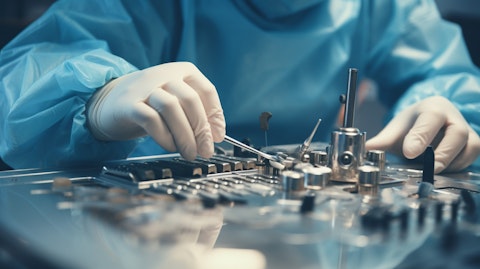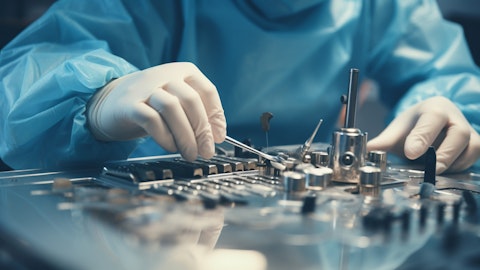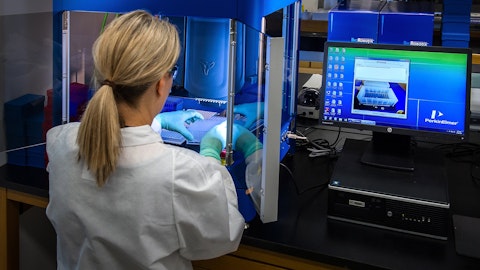Integra LifeSciences Holdings Corporation (NASDAQ:IART) Q1 2024 Earnings Call Transcript May 6, 2024
Integra LifeSciences Holdings Corporation misses on earnings expectations. Reported EPS is $-0.04221 EPS, expectations were $0.55. IART isn’t one of the 30 most popular stocks among hedge funds at the end of the third quarter (see the details here).
Operator: Good day, and welcome to the Integra LifeSciences First Quarter 2024 Financial Results Conference Call. [Operator Instructions] Please be advised, today’s conference is being recorded. I would now like to hand the conference over to your speaker, Mr. Chris Ward, Senior Director, Investor Relations. Please go ahead.
Chris Ward: Thank you, Shareen. Good morning, and thank you for joining the Integra LifeSciences First Quarter 2024 Earnings Conference Call. With me on the call are Jan De Witte, President and Chief Executive Officer, and Lea Knight, Chief Financial Officer. Earlier this morning, we issued a press release announcing our first quarter 2024 financial results. The release and corresponding earnings presentation, which we will reference during the call, are available at Integralife.com under Investors, Events and Presentations, in a file named First Quarter 2024 Earnings Call Presentation. Before we begin, I want to remind you that many of the statements made during this call may be considered forward-looking. Factors that could cause actual results to differ materially are discussed in the company’s Exchange Act reports filed with the SEC and in the release.
Also in our prepared remarks, we will reference reported and organic revenue growth and organic revenue growth, excluding Boston. Organic revenue growth excludes the effects of foreign currency, acquisitions, and divestitures. Organic revenue growth, excluding Boston, excludes revenues from products manufactured in our Boston facility in both periods. Management believes that excluding revenue from all products manufactured at the Boston plant, provides useful information when evaluating the company’s organic growth because of the unusual nature of the manufacturing stoppage and voluntary global recall. Unless otherwise stated, all disaggregated and franchise-level revenue growth rates are based on organic performance. And lastly, our comments today will include certain non-GAAP financial measures.
Reconciliations of non-GAAP financial measures can be found in today’s press release, which is an exhibit to Integra’s current report Form 8-K filed with the SEC. And with that, I will now turn the call over to Jan.
Jan De Witte: Thank you, Chris, and good morning, everyone. It’s a pleasure to be here together with Lea to update you on our first quarter results and guidance for the year. Let me start by saying the performance during this period reflected robust market demands, the contribution of having a broad and diversified product portfolio, and solid execution by Integra colleagues around the world, to deliver on our 2024 key priorities and progress our strategy. If we move to Slide number 4, our first quarter revenues finished at $369 million, above our February guidance range, partially driven by orders that closed earlier than forecasted. Organic revenue was down 2.5% compared to the prior year, primarily due to the Boston revenue included in the first quarter of 2023.
Excluding Boston, organic growth was 1.6%. We delivered adjusted EPS of $0.55 within our guidance range. Our Codman Specialty Surgical business saw a strong start to the year, growing 4.1% and in line with our growth expectations for this business. Performance was driven by several of our leading products and brands. In CSS management, dural access and repair and neuromonitoring. In addition, we saw continued strength in our international markets, which have delivered consistent high single to low double-digit growth. We expect to continue to build on this momentum in our international markets as we expand access to our products in new markets, and broaden our commercial reach and capabilities. We also completed the global relaunch of CereLink in the quarter, and we’re pleased with the strong market uptake, demonstrating the resilience and differentiation of our intercranial pressor monitoring portfolio.
Furthering our legacy of strategic M&A to broaden our impact, we recently closed our acquisition on Acclarent, a pioneer in ear, nose, and throat surgical interventions. This deal positions Integra as a leader in the ENT segment, expands our addressable market, and provides immediate scale and accretive growth to our portfolio. Acclarent’s strong commercial capabilities, R&D expertise, advanced portfolio, and deep clinical knowledge, will be important synergistic assets for Integra, enabling us to deliver transformative technologies to restore patients’ lives. We’re excited to welcome our new Acclarent colleagues. Together, we will make a profound impact on ENT and neurosurgical care. Within our Tissue Technologies business, we continue to see healthy demand for our broad portfolio of wound reconstruction products.
We delivered triple-digit growth in DuraSorb and we’re tracking ahead of our deal model. Leveraging another recent acquisition, we further expanded our UBM wound care platform with the launch of MicroMatrix Flex, a dural syringe system enabling the convenient mixing and precise delivery of MicroMatrix paste in complex wounds. As we outlined during our February call, production of Integra Skin was not able to keep up with strong demand, leading to a 4.4% sales decline in Tissue Technologies, excluding Boston. Moving on to Boston, we completed the external audit of the Boston plant and received the final report from the third-party auditor in March. You will recall that this audit was required by the FDA as part of our process to address the warning letter observations and resume production.
While we anticipated this audit would yield findings, and that there would be work left to complete, the audit report contained more findings than we anticipated. We’re still determining the full scope of the work required to address these findings and to resume commercial distribution. Based on our preliminary assessment, we no longer expect to resume commercial distribution in 2024. We remain fully committed to resolving the issues in Boston and bringing the products back to the market for our customers and patients. Turning to guidance, we’re updating our revenue guidance for the year to a range of $1.67 billion to $1.69 billion, reflecting the contribution of three quarters of revenue from Acclarent, and the removal of all 2024 revenues for SurgiMend and PriMatrix.
We are also updating our full year adjusted earnings per share to a range of $3.01 to $3.11 per share to reflect supply chain challenges and the removal of the Boston revenues. Lea will provide more color on our updated guidance for the second quarter and the full year. Now, before I turn the call over to Lea, let me assure you, we’re deeply focused on fixing our supply issues and returning the Boston portfolio to the market. We remain committed to realizing Integra’s full potential by serving our robust markets through the strength of our broad and diversified portfolio, and making strategic investments in inorganic opportunities like Acclarent to broaden our portfolio and our reach. Our first quarter results and full-year mid-single-digit organic growth guidance reflects the progress we are making.
Now, over to Lea.
Lea Knight: Thank you, Jan. Let’s take a more detailed look at our first quarter financial highlights, and I’ll start on Slide 5. Jan mentioned first quarter total revenues were approximately $369 million, representing a decrease of 3.1% on a reported basis and 2.5% on an organic basis. Total revenues were approximately $4 million above the high end of the guidance range communicated back in February, primarily driven by favorable order timing. First quarter revenue growth was strong across many parts of our business, with organic growth of 4.4% in Codman Specialty Surgical and 8.7% in our international business. Tissue Technologies was down 15.3%, driven by approximately $15 million of Boston revenues in Q1 2023. Our adjusted EPS for the quarter was $0.55, down 25.7% compared to 2023.

Looking at the middle of the P&L, gross margins were 64.4% for the first quarter, down 290 basis points versus 2023. Gross margins were impacted by approximately 170 basis points in unfavorable revenue mix from lower Integra Skin and stronger international sales, and approximately 130 basis points from lower utilization and higher scrap in the quarter. Our adjusted EBITDA margins were 19.5%, down 470 basis points compared to 2023. Our decline in adjusted EBITDA margins primarily reflects the decrease in gross margins. Operating cash flow for the first quarter was $16 million. If you turn to Slide 6, we’ll take a deeper dive into our CSS revenue highlights for the first quarter. Reported Q1 revenues in CSS were $256 million, up 3.4% on a reported basis, and 4.4% on an organic basis from the prior year.
Global sales in neurosurgery grew 6.3% on an organic basis as a result of low double-digit growth in neuromonitoring, driven by the relaunch of CereLink, mid-single-digit growth in CSS management, driven by Certas Plus valves, and mid-single-digit growth in dural access and repair, driven by DuraGen. The growth across these franchises was partially offset by an expected low single-digit decline in advanced energy, which is driven by a tough comp from CUSA capital in the first quarter of last year. As we move past the first quarter comp, we expect to see positive growth for the global CUSA capital and disposable portfolio in 2024. For the first quarter, our capital sales were up low double-digit, driven by the relaunch of CereLink, which has delivered results in line with our expectations.
Turning to instruments, we saw an approximate 2% decline, driven by a challenging comp versus the first quarter of 2023. On a full-year basis, we expect that business to return to a mid-single-digit growth trajectory. Shifting to our international business, we saw another strong quarter in CSS, with high single-digit growth. Strength in the quarter was driven by double-digit growth in China, Latin America, Middle East and Africa, and mid-single-digit growth in the rest of Asia Pacific and Europe. Moving to our Tissue Technologies segment on Slide 7, Tissue Technologies was down 15.3% on a reported and organic basis compared to the prior year. Excluding Boston, organic growth was down 4.4%. First quarter sales in the wound reconstruction franchise decreased by 19.9%.
Excluding Boston, we experienced an organic decline of 6.3%, driven by the supply constraint on Integra Skin that we discussed in February. Excluding Boston, first quarter revenues in Tissue Technologies were driven by a low double-digit decline in Integra Skin, MicroMatrix and Cytal, partially offset by greater than 100% growth in DuraSorb and mid double-digit growth in Gentrix. Although our revenues were down for the quarter, we continue to see strong demand for our wound care portfolio, which continues to provide us with confidence in the long-term growth potential of our complex wound reconstruction business. As our supply recovers, we are well positioned to return to a steady growth trajectory. In private label, sales were down 0.6% versus last year, up 0.7%, excluding Boston products.
Private label performance in Q1 was slightly below historic performance for the business due to the timing benefit from our Q4 overperformance and a strong Q1 2023 comp. Finally, international sales in Tissue Technologies were down low double-digits, primarily due to the Boston recall and Integra Skin supply, partially offset by low double-digit growth in MicroMatrix, Cytal, and MediHoney. If you turn to Slide 8, I will briefly update our balance sheet, capital structure and cash flow. During the quarter, operating cash flow was $15.7 million and free cash flow was $0.3 million, reflecting continued spend on EU MDR, CapEx and increased working capital primarily from investments in inventory. Free cash flow conversion was 26.4% on a trailing 12-month basis.
Our balance sheet remains strong, with ample liquidity for our short and long-term plans. As of March 31, net debt was $1.2 billion, and our consolidated total leverage ratio was 3.2x. The company had total liquidity of $1.5 billion, including $663 million in cash and short-term investments, and the remainder available under our revolving credit facility. Our balance sheet flexibility enabled us to complete the Acclarent acquisition at the beginning of Q2. If you turn to Slide 9, I’ll provide our consolidated revenue and adjusted earnings per share guidance for the second quarter and full-year 2024. Second quarter revenues are forecasted to be between $411 million $416 million, representing reported growth in the range of approximately 7.8 to 9.1%, and organic growth in the range of approximately 1.3% to 2.6%.
Our forecast reflects the diverse portfolio and strong global demand for our products, favorable comp from Boston returns in Q2 2023, and the impact in the second quarter from favorable order timing in the first quarter. Our second quarter guidance also includes approximately $25 million at the midpoint in Acclarent sales beginning on April 1st. For the full year, revenues are forecasted to be in the range of $1.67 billion to $1.69 billion. Our updated full-year guidance removes revenues of approximately $10 million previously forecasted from the returns of the Boston portfolio beginning in the third quarter. Forward guidance also includes approximately $80 million in Acclarent sales beginning in the second quarter. We expect our reported growth to be in a range of 8.4% to 9.4%, and organic growth to be 3.3% to 4.3% for the full year 2024.
Turning to adjusted earnings per share guidance. For the second quarter, we expect adjusted EPS to be $0.60 to $0.65. Our second quarter EPS reflects higher supply chain costs due to ongoing remediation efforts, scrap, and lower plant utilization for the full year, we are updating our adjusted EPS to be in the range of $3.01 to $3.11 per share, reflecting the delay of the relaunch of SurgiMend and PriMatrix, the full-year impact of higher supply chain costs, and the inclusion of the Acclarent acquisition, which we still expect to remain EPS-neutral for the year. Before I turn the call back to Jan, I’d like to take you through key considerations for our full-year revenue outlook on Slide 10. As we move past the first quarter comp with CUSA capital, catch up to demand levels on Integra Skin, and resolve backorders in our CSS business, we have a clear path to mid-single-digit growth or better in most franchises in our portfolio.
We remain committed to confronting our supply challenges and are determined to resolve them. At the same time, we are focused on maintaining the growth momentum we have today, and fully activating our growth potential across the balance of the portfolio. Let me turn it back to Jan.
Jan De Witte: Thank you, Lea, and please turn to Slide 11 to conclude compared to March. In the first quarter, we saw a healthy demand for our portfolio of differentiated products across several parts of our business, despite supply headwinds. With our first quarter performance, our first half is on track to meet our expectations, and we anticipate returning to more reliable cadence of mid-single-digit growth in the second half of the year. We have passed our organic and inorganic global growth strategy, a successful global relaunch of CereLink, ongoing international expansion of our portfolio of leading brands and commercial capability, and continued execution of our M&A game boards, as demonstrated by the integration and outperformance of SIA, with its DuraSorb products, and the close of the Acclarent acquisition.
We understand the frustration that our customers, investors, and employees feel about the results from the audit in Boston, but I assure you, we are focused on the additional remediation work and other changes necessary to bring our products back and strengthen our supply chain execution, and this is achievable. I remain confident that Integra has a bright future ahead. We have markets with stable growth. We have strong commercial capabilities, and we have a diversified portfolio of leading products to fuel our expansion. Our leadership team, our board, and our employees, remain committed to achieving reliable long-term business performance and to building robust capabilities to deliver life-saving technologies to patients, while driving consistent mid-single-digit top-line growth, strong profitability and cash flow for our shareholders.
With that, I’d like to open the line for Q&A.
See also 20 Biggest Chemical Companies in Australia, 2024 and 20 Biggest Natural Gas Companies in Australia, 2024.
Q&A Session
Follow Integra Lifesciences Holdings Corp (NASDAQ:IART)
Follow Integra Lifesciences Holdings Corp (NASDAQ:IART)
Receive real-time insider trading and news alerts
Operator: [Operator Instructions] And our first question will come from the line of Vik Chopra with Wells Fargo. Your line is open.
Vik Chopra: Hey, good morning and thanks for taking the questions. So, regarding your Boston facility recall and restart, I think the news came today as a surprise to a lot of people. So, it sounds like you don’t expect to resume commercial distribution in 2024. Can you maybe share some additional details around what the results of the audit revealed? And then, does this mean you have to sort of revisit your LRP? And then I had a follow-up, please.
Jan De Witte: Yes, good morning, Vik. Thanks for that question. So, look, when we communicated in February, we believed our timeline was achievable based on plans to satisfy the thresholds of the warning letter. Now, despite how much we accomplished leading up to the dress rehearsal, we were not as far along as we thought. The final audit confirmed that there’s more to be done. That’s a result that we acknowledge and accept as a result of that final audit. Now, none of this should cloud the fact that we remain committed to bringing the products back to market for the benefit of our surgeons, our patients, and shareholders. So, we’ve made changes to the operations and quality leadership and structure to ensure the right focus and capabilities is applied to Boston, but also our broader quality system and the broader supply improvements there.
In terms of your question, updating LRP at this point in time, we don’t give any updates on LRP. We are working to update the planning for Boston, and we’ll probably give updates later in the year as we get there.
Vik Chopra: Okay. Thank you for the comprehensive update. And then my follow-up question. In late April, seven MACs published a proposed LCD for the treatment of DFUs and VLUs. Can you just remind us what impact this has on Integra and what percent of your products are exposed to this proposed LCD? Thank you very much.
Jan De Witte: Yes. On the LCD, these new proposed LCDs regarding the coverage for Skin substitutes are focused on the DFU and the VLU, the diabetic foot ulcers and the venous leg ulcers space. The two products that Integra has that are indicated for these wound types are Omnigraft and PriMatrix, and they remain covered under those new proposed LCDs. So, that’s good news for Integra. It is, however, still today a small part of our business. So, on the one hand, we’re happy our products remain covered, but for the short term, I would say that the impact to Integra is neutral, but it represents an opportunity for the future. Plus, we like the trends with these LCDs proposal, which seem to support products that deliver strong outcomes and have rich clinical evidence. And that’s areas or products where we feel Integra is positioned strongly.
Operator: Thank you. One moment for our next question, and that will come from the line of Steve Lichtman with Oppenheimer. Your line is open.
Steve Lichtman: Thank you. Good morning. I guess, first, Jan, if you could talk about the next steps in Boston. What are the milestones that investors should be looking for as you go through the rest of this year?
Jan De Witte: So, at this point, we are as I said, still determining the work plan. We’re translating the observations from the latest audit into a work plan. That’s going to determine the milestones. So, at this point in time, there’s no specific milestones yet, but we know enough to come to the conclusion that we are pushing out the PriMatrix and SurgiMend revenues for this year.
Steve Lichtman: Okay. And then, Lea, can you talk about the gross and operating margin assumptions that are implied in the EPS guidance for 2Q and full-year, and any sort of considerations that we should be thinking about on both?
Lea Knight: Yes, so thank you, Steve. From a gross margin perspective, let me talk about full-year first and then I’ll step back and talk about Q2. On a full-year basis, in February, we communicated gross margins that would be flat, modestly up. In light of the ongoing remediation costs that we’ll incur based on the Boston timeline, you should now think about gross margins that will be moderately down year-on-year versus 2023. And again, that’s a combination of the additional remediation cost in Boston and then some of the lower utilization and higher scrap that we called out as well. From a Q2 perspective, you’ll see a little bit of that same dynamic, right? So, we do expect to be up modestly sequentially from Q1, but we will see the impact year-over-year from lower utilization, higher scraps, some of the remediation costs that characterize what we saw year-over-year in Q1.
Steve Lichtman: Okay. Thanks, Lea. I’ll jump back in queue.
Operator: Thank you. One moment for our next question, and that will come from the line of Kristen Stewart with C.L. King. Your line is open.
Kristen Stewart: Hi. Thanks for taking the question. I was wondering if you could just provide an update with Integra Skin, the supply constraints, and when we should see those start to ease?
Lea Knight: Yep. Thank you, Kristen. Yes. So, from a Integra Skin perspective, our production is running, but we are not at full capacity yet. We have continued throughout Q1 and Q2 to ship to our customers, and demand does remain very strong. We’ll be working to catch back up to full demand in the second half, and that’s what’s contemplated in the guide that I provided. I think on the whole, we are really happy with the demand that we’re seeing in Integra Skin, and it gives us confidence to continue to make some of the CapEx investments that we’ve been making to build out capacity to support the long-term growth on that brand.
Kristen Stewart: Okay. And then just on Acclarent, can you just remind us what your assumptions are in terms of the growth profile of that business going forward under your leadership?
Lea Knight: Happy to. First, I’d like to say, we are absolutely thrilled at completing the acquisition of Acclarent on April 1 and welcoming that team as part of our Integra family. Just as a general reminder, part of our excitement is the fact that that acquisition gives us immediate commercial leverage and scale in the ENT specialty device space, which is a natural adjacency to our CSS business. It’s a category that’s growing at 5% to 6%. It’s over $1 billion. And we’re happy about the product portfolio that comes with it and assets like the TruDi nav offering system, as well as the expanded indication that we’ve gotten in the AERA eustachian tube dilation system. So, overall, just again, really happy to have that as part of our product portfolio.
From a guidance perspective, we have assumed for the three quarters that we’ll have Acclarent on board, revenue of $80 million. That guidance approach does reflect the understanding that with integrations of this sort, there is some uncertainty. And so, that has been factored into that assumption. That said, we still believe that this acquisition will be growth-accretive to our base business. And so, it’s capable of operating at high single-digit levels on a full-year basis.
Operator: And one moment for our next question, and that will come from the line of Robbie Marcus with J.P. Morgan. Your line is open.



